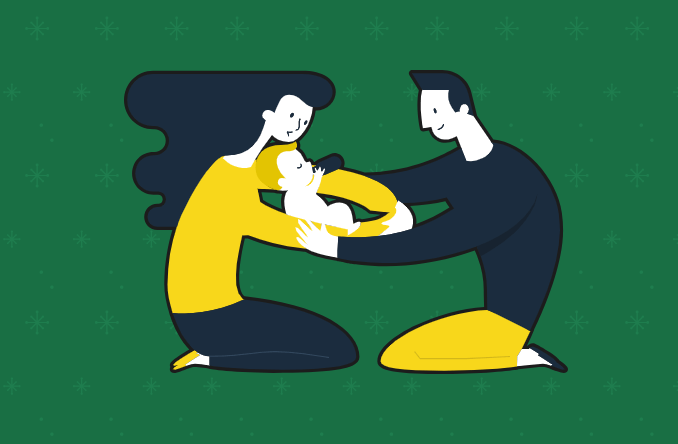
From 1-month-old newborns to 12-month-olds, let’s look at setting some 'monthly missions' starting today!
1 Month: Lots of hugs.
Mom and Dad are still unfamiliar with the newborn. In order for a couple to become parents, they need time to get used to their child. Hold your baby a lot during this time. Hold the baby's hand and touch their toes. Gradually, the conviction that 'this child is my child' arises. Don't forget that the basics of parenting start with love!
2 Months: Use a rattle toy to help your child develop their hearing.
To shake the rattle, have the child hold the rattle in their hand, and shake it together. When a mother sings to the sound of a rattle, a smile appears on her child's face.
3 Months: Separation of day and night.
There is a saying that there is a 'a 100-day miracle'. This means that your child will gradually sleep for more than 6 hours after 100 days, distinguishing between day and night. Parents must also inform children of the day/night distinction. The night is dark and quiet! You can help change the mood to a nighttime mood. If the night is noisy, for example, with the sound of the TV, it will be difficult for your baby to sleep.
4 Months: Tummy Time.
At this time, your child learns to turn over and support the neck. If you practice 'Tummy Time' frequently, it is good for the development of the baby's muscles. Have the child lie down and shake their rattle to draw their attention upwards.
Your child will practice holding their head up to look at you. You can practice this 2-3 times a day for 3-5 minutes. As your child gets used to it, gradually increase the time.
5 Months: The first teeth appear around 4 to 6 months of age.
Many babies suffer from teething pain. Help your child chew softly by giving them a soft teething toy, which help relieve your baby’s stress.
6 Months: Playing Peek-a-boo.
Through peek-a-boo, babies learn the concept of object permanence. You learn that even if an object disappears in front of you, it will continue to exist. Recognising the concept of object permanence, your baby becomes aware of the fact that their mother is with them, even though they can’t see their mother in front of them.
7 Months: Play Peek-a-boo.
Let's keep playing peek-a-boo with your 7-month-old baby. By claping their hands, parents and children can communicate. Clap your hands together and make a sound. 'What is this sound?', you child might wonder.
It's good to sing songs and create rhythms together. As the child is learning the process of sitting, sitting alone, and playing, they will be developing their muscles.
8 Months: Fine Motor Development Play.
Babies can start to hold onto objects and stand up. The movements of their fingers are also more delicate, so they can even pull a handkerchief or pull out a tissue. Practicing holding objects with their thumb and forefinger will help your baby develop fine motor skills.
Wash out a used powdered milk container and put a handkerchief or a small ball in it. Your baby will take out this handkerchief or ball and feel great satisfaction.
9 Months: Straw Cup Challenge
Let's start using straw/sippy cups, not baby bottles. Pour water, milk powder, etc. into a straw cup and gradually say goodbye to the baby bottle. A lightweight material that a child can lift alone is recommended. Above all else, the straw cup is easy to wash!
10 Months: Learning Pai Pai
This is the time to imitate the social behaviors of adults. You can learn how to 'Pai Pai' with your hands. Learn the habit of saying 'hello' when meeting and parting with mom and dad.
11 months: Babies need time to play alone.
As they explore the world in their own way, they naturally become 'children'. While it's important to provide a parental play curriculum, sometimes help your child play alone. When a child chooses a play activity on their own, the parent becomes a spectator and responds only to the child's activity. At this time, please keep an overall calm atmosphere.
12 Months: Practicing Toddling
Mum and dad together can help babies walk. Hold your baby's hand and practice walking one or two steps at a time. However, your baby decides when to start walking. You don't have to force them to walk. If your child is interested in walking or standing alone, light help is sufficient.
PS: There is a difference in the growth and development of different children, so do not be impatient!
---------------------------------------------------
Author: Deok Hyun Jang
- Former Nursery School Director
- A veteran teacher who has been running a daycare center for 20 years.







